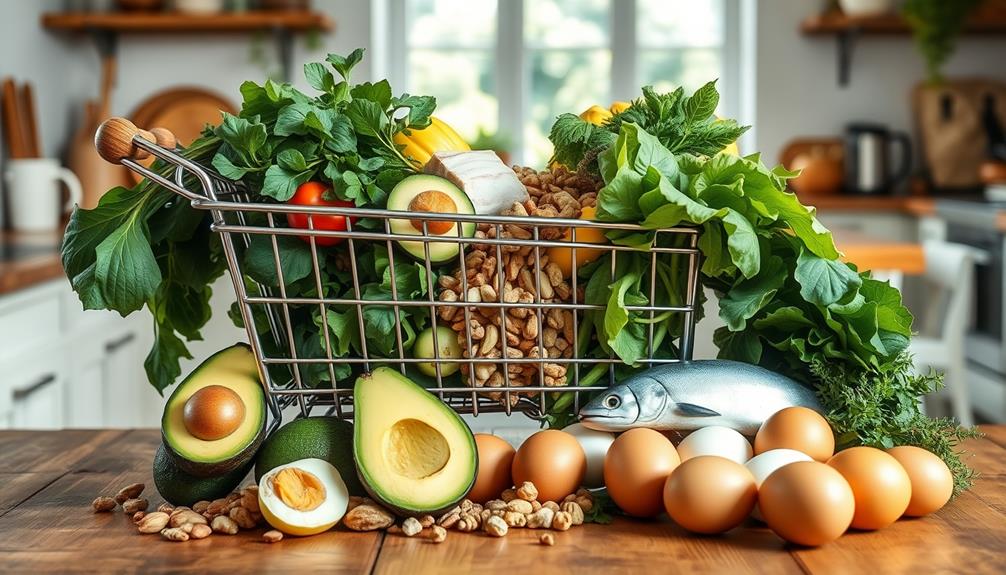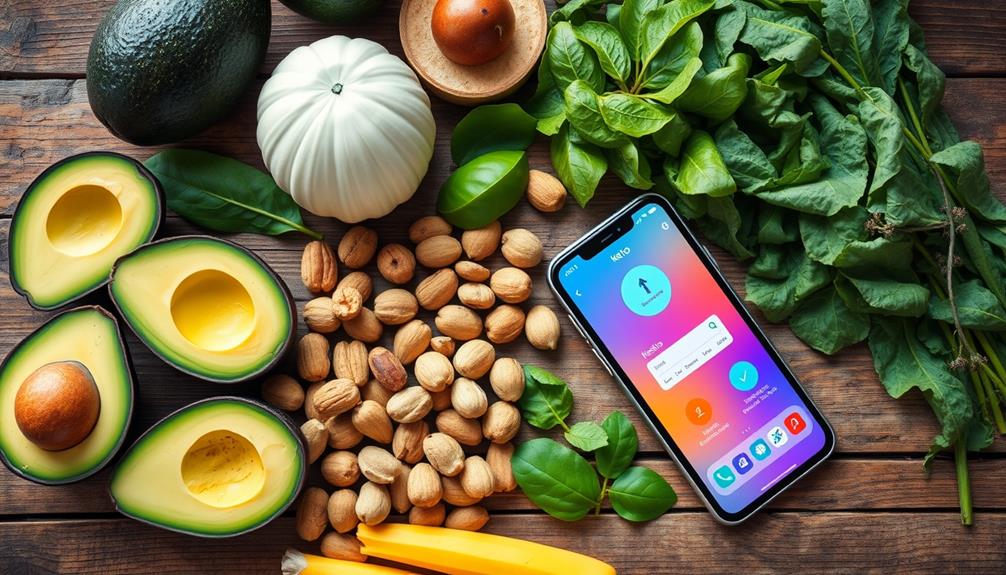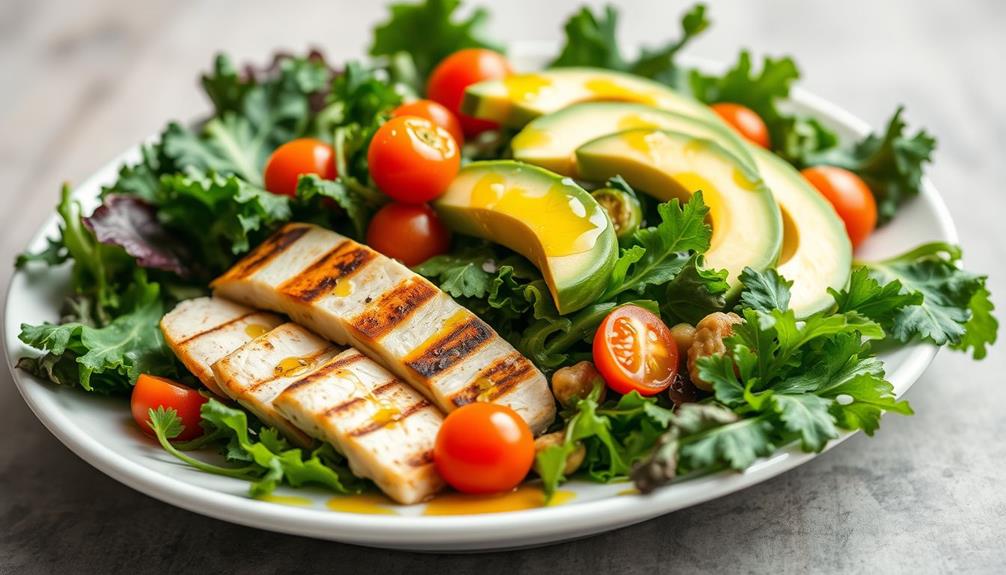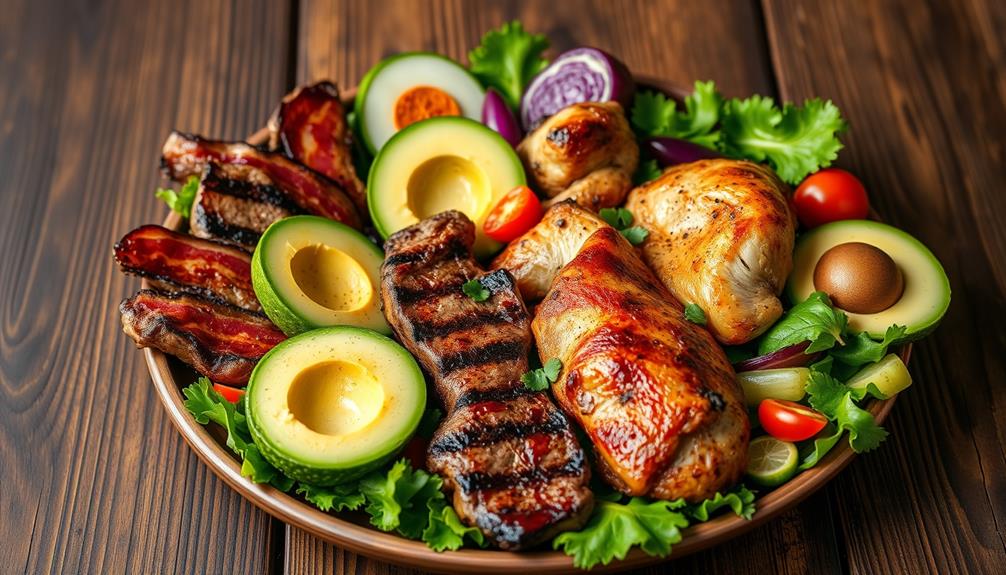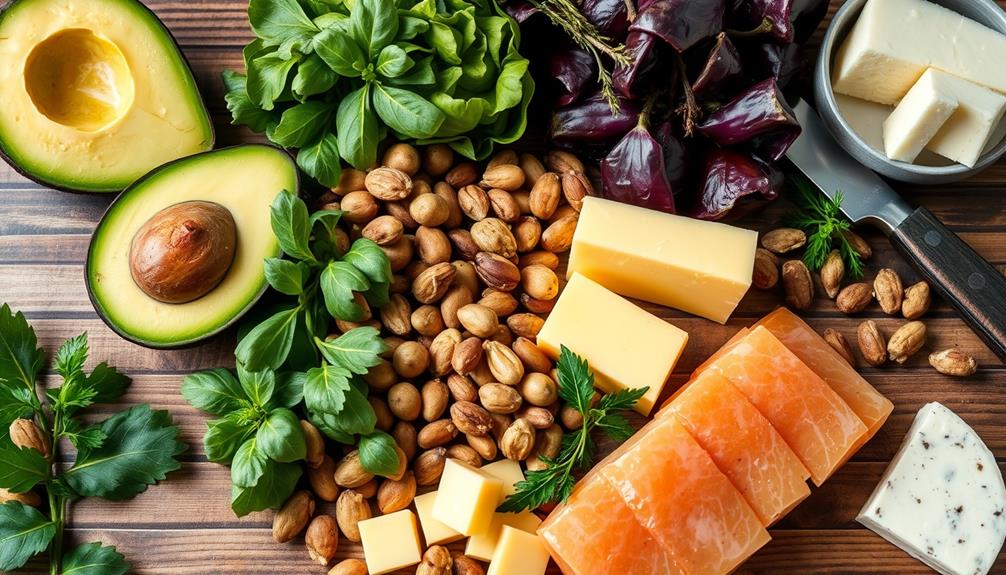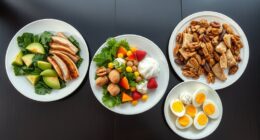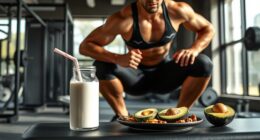To create the best keto diet grocery list, focus on high-quality protein sources like chicken, beef, and eggs. Stock up on healthy fats such as coconut oil and olive oil, and include plenty of low-carb vegetables like leafy greens and zucchini. Don't forget pantry staples like almond flour and keto sweeteners for variety. For snacks, opt for macadamia nuts and cheese crisps. When it comes to beverages, choose black coffee or unsweetened tea. Following this guide will keep you on track with your keto goals, and there's more helpful information just ahead to enhance your success. To add some flavor to your dishes, consider the best onion options for keto, such as green onions and shallots, which are lower in carbs compared to traditional onions. These can add a nice touch to your meals without derailing your keto efforts. Additionally, take the time to plan your meals and snacks ahead of time to ensure that you have everything you need on hand for a successful keto diet journey.
Key Takeaways
- Focus on high-quality protein sources like chicken, beef, and fatty fish to meet protein needs.
- Prioritize healthy fats such as grass-fed butter and olive oil to achieve high caloric intake.
- Incorporate low-carb vegetables like leafy greens and zucchini for essential nutrients with minimal carbs.
- Stock pantry staples including almond flour and keto sweeteners to enhance meal variety and flavor.
- Choose keto-friendly snacks like macadamia nuts and cheese crisps for satisfying, low-carb options.
Overview of the Keto Diet
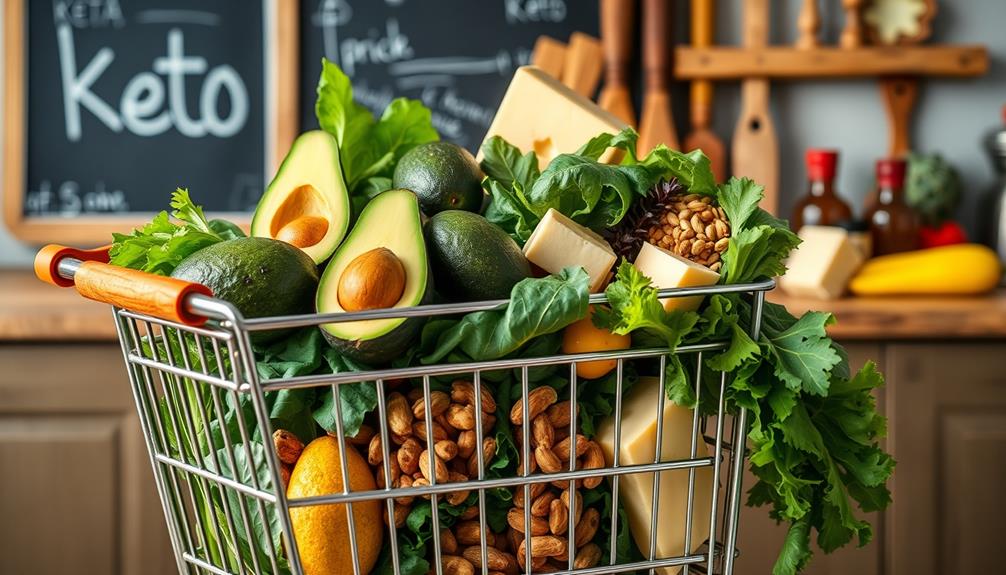
Have you ever wondered how the ketogenic diet can transform your eating habits? The keto diet is all about a low carbohydrate intake, typically under 30-50 grams of net carbs daily. Instead, you'll focus on high fats, which make up 70-80% of your daily calories. This shift helps your body enter a metabolic state known as ketosis, where it burns fat for fuel rather than carbs. As a result, many people experience significant weight loss and increased energy levels.
Understanding your budget for grocery shopping can further enhance your keto journey by ensuring you prioritize healthy food choices.
Originating nearly a century ago as a treatment for epilepsy, the keto diet has gained popularity for its rapid weight loss effects and potential health benefits. When meal planning, you'll want to prioritize healthy fats like olive and coconut oils while limiting sugars and starchy foods. This approach helps stabilize your insulin levels.
However, be prepared for possible side effects during your initial alteration, often dubbed the "keto flu." Symptoms like headaches and fatigue can occur for a few days to a couple of weeks as your body adjusts.
When you hit the grocery store, keep these principles in mind to set yourself up for keto success!
Understanding Macronutrients
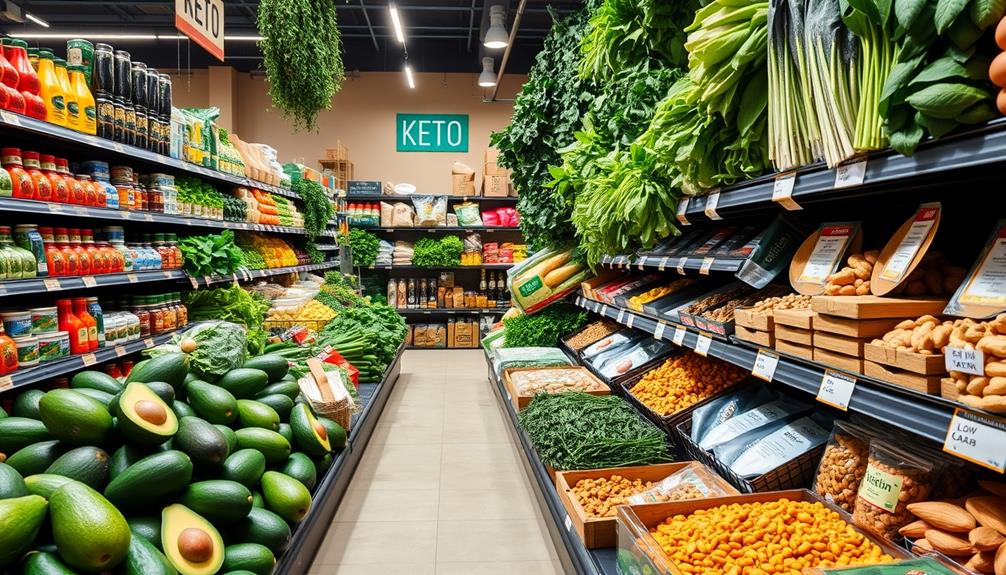
To succeed on the keto diet, you need to grasp the essential macronutrient ratios: about 70-80% fats, 10-20% protein, and just 5-10% carbohydrates.
Understanding the importance of net carbs is vital, as keeping your intake between 30-50 grams daily helps maintain ketosis.
Including high-fat foods rich in antioxidants, such as avocados or certain oils, can provide additional health benefits, similar to how cranberry juice consumption may boost overall wellness.
With this knowledge, you can make informed choices at the grocery store.
Macronutrient Ratios Explained
When it comes to the ketogenic diet, understanding macronutrient ratios is essential for achieving and maintaining ketosis. The typical keto macronutrient ratios consist of approximately 70-80% fat, 10-20% protein, and 5-10% carbohydrates. This high fat intake is vital as it helps induce ketosis, allowing your body to burn fat for fuel.
Incorporating natural remedies alongside conventional medications can also support overall health during dietary changes.
For a standard 2,000-calorie diet, you'd aim for about 167 grams of fat, 100 grams of protein, and just 25 grams of carbohydrates daily. Prioritizing unprocessed fats, especially polyunsaturated and monounsaturated fats, can enhance the health benefits of your diet.
Protein should be consumed in moderation, around 25% of your daily calories, to support muscle maintenance without disrupting ketosis. Staying mindful of your carbohydrate intake is equally important; aiming for a net carbohydrate intake of 30-50 grams per day will help you maintain your body's state of ketosis and optimize fat-burning.
Importance of Net Carbs
Understanding the importance of net carbs is essential for anyone following a ketogenic diet. Net carbs are calculated by subtracting fiber and certain sugar alcohols from total carbohydrates, reflecting the carbs that impact blood sugar levels. To maintain ketosis, you should aim for a net carb intake of 30-50 grams per day.
Here's a quick way to understand the components of net carbs:
| Food Item | Total Carbs | Fiber & Sugar Alcohols | Net Carbs |
|---|---|---|---|
| Avocado (1 medium) | 12g | 10g | 2g |
| Almonds (1 oz) | 6g | 3g | 3g |
| Broccoli (1 cup) | 6g | 2g | 4g |
| Erythritol (1 tbsp) | 4g | 4g | 0g |
| Cauliflower (1 cup) | 5g | 2g | 3g |
Essential Grocery List
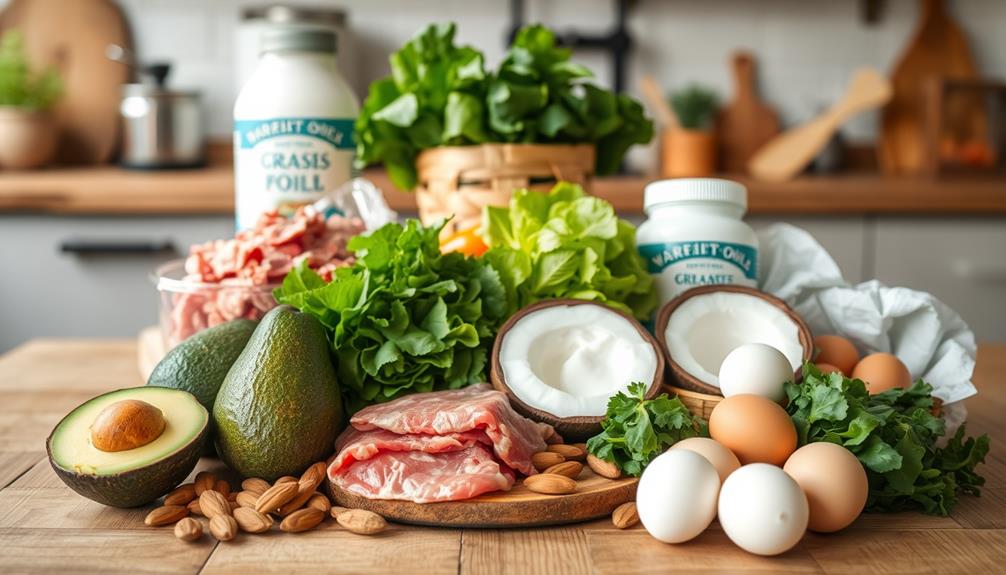
Creating a successful keto diet hinges on a well-planned grocery list that prioritizes low-carb foods. To effectively promote ketosis, focus on items containing less than 5 grams of carbs per serving. Understanding the importance of quality ingredients is vital in achieving your health goals, whether it's enhancing your meal flavors or discovering new innovative coffee gear and accessories that can elevate your morning routine.
Here's an essential grocery list to get you started:
- High-Quality Protein Sources: Stock up on chicken, beef, pork, fatty fish, and eggs. These will help you meet your daily protein requirements while keeping your meals satisfying.
- Healthy Fats and Oils: Choose grass-fed butter, coconut oil, avocado oil, and olive oil. Aim for these to comprise about 70% of your daily caloric intake, ensuring you stay in ketosis.
- Low-Carb Vegetables: Fill your cart with leafy greens, zucchini, and cauliflower. These low-carb vegetables are nutrient-dense and versatile for various keto-friendly recipes.
- Pantry Staples: Don't forget almond flour, keto sweeteners, and low-carb condiments. These essentials enhance meal variety and flavor while adhering to your keto diet grocery list.
Protein and Snack Choices
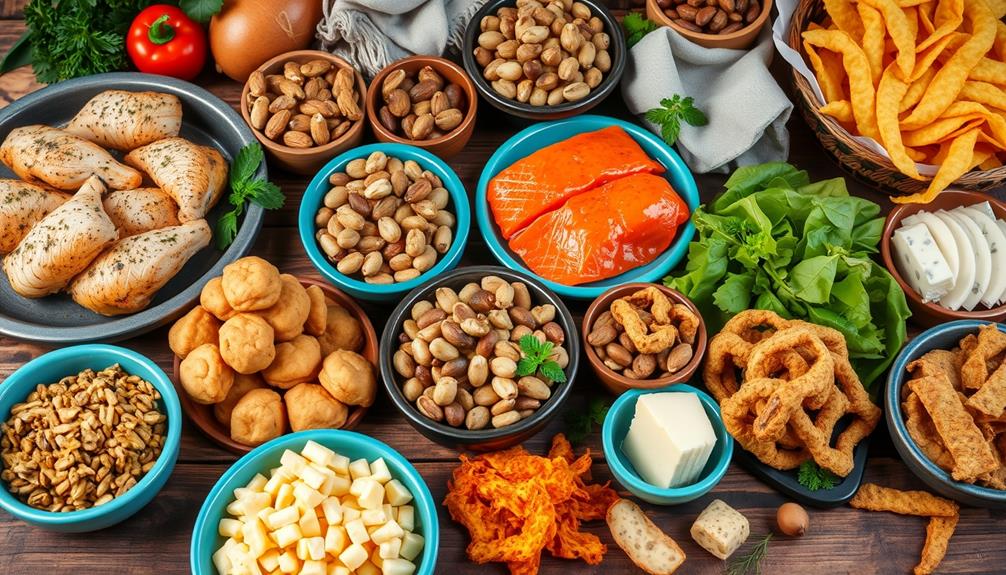
When it comes to the keto diet, choosing high-quality protein sources is essential for staying on track. Focus on incorporating options like grass-fed beef, dark meat chicken, and versatile eggs into your meals, as these choices can enhance your overall health and support your dietary goals.
Additionally, consider effective strategies for weight loss to maintain motivation throughout your keto journey.
Don't forget to stock up on low-carb snacks like macadamia nuts and almond butter to keep your energy levels up throughout the day.
High-Quality Protein Sources
For anyone diving into the keto diet, incorporating high-quality protein sources is vital for meeting your nutritional needs while keeping carbs low. These foods not only help maintain muscle mass but also provide energy for your daily activities, making them critical for success on a keto plan.
Here are some excellent options to take into account:
1. Eggs: With about 6 grams of high-quality protein per large egg, they're versatile and perfect for various meals.
2. Grass-fed beef: This protein source not only supports sustainable farming but also offers higher omega-3 fatty acids, making it a nutritious choice for keto enthusiasts.
3. Fatty fish: Salmon and sardines are both low in carbs and high in protein, delivering around 22 grams of protein per 3.5-ounce fillet while promoting heart health.
Exploring different coffee varieties can also enhance your culinary experience while on a keto diet.
4. Dark meat chicken: Chicken thighs and drumsticks contain more fat and provide about 23 grams of protein per 3.5-ounce serving, making them flavorful and satisfying.
Don't forget about healthy fats from nuts! Macadamia nuts are a great option, providing about 2 grams of protein per ounce while remaining low in carbs.
Low-Carb Snack Options
Steering the keto diet doesn't mean sacrificing flavor or satisfaction when it comes to snacks. You can enjoy a variety of delicious, low-carb options that keep your taste buds happy while aligning with your dietary goals. Here's a quick guide to some tasty keto snacks:
| Snack Option | Description |
|---|---|
| Hard-Boiled Eggs | Versatile, rich in protein, and virtually no carbs. |
| Low-Carb Nuts | Macadamia nuts and pecans are high in healthy fats. |
| Cheese Crisps | Satisfying and a good source of protein and fat. |
| Keto-Friendly Protein Bars | Low sugar and high protein to meet your needs. |
| Vegetable Sticks with Dips | Pair cucumber or bell pepper with guacamole or cream cheese for a nutritious bite. |
Incorporating these snacks into your routine not only keeps you full but also helps you stay on track with your keto lifestyle. Grab some hard-boiled eggs, a handful of low-carb nuts, or cheese crisps, and you'll have delicious options ready to go. Don't forget to experiment with high-fat dips for added flavor!
Pantry Staples and Essentials
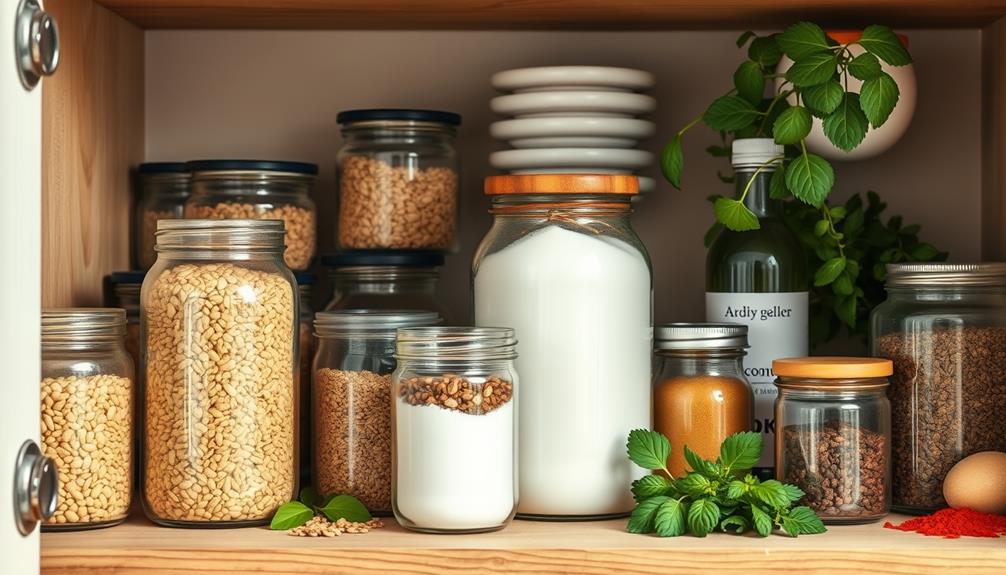
To successfully navigate the keto diet, stocking your pantry with the right essentials is essential. Having a well-stocked pantry not only simplifies keto diet shopping but also makes meal prep quick and easy.
Consider incorporating some essential oils for overall wellness to complement your diet and enhance your cooking experience. Here are some pantry staples you should consider:
- Almond Flour: This low-carb baking alternative is perfect for creating various keto-friendly recipes.
- Healthy Fats: Incorporate olive oil and avocado oil for cooking and salad dressings, providing essential fatty acids without added carbs.
- Canned Goods: Keep tuna, sardines, or olives on hand for a quick source of protein and healthy fats that are low in carbohydrates.
- Keto-Friendly Sweeteners: Stock up on erythritol, monk fruit, or stevia to satisfy sweet cravings without compromising your carb intake.
Don't forget to add dried herbs and spices to enhance flavors in your meals without any carbs.
These pantry staples won't only help you stay on track with your keto diet but also make your cooking more enjoyable and diverse. With these essentials, you'll be ready to whip up delicious meals that align with your keto lifestyle.
Beverage Options
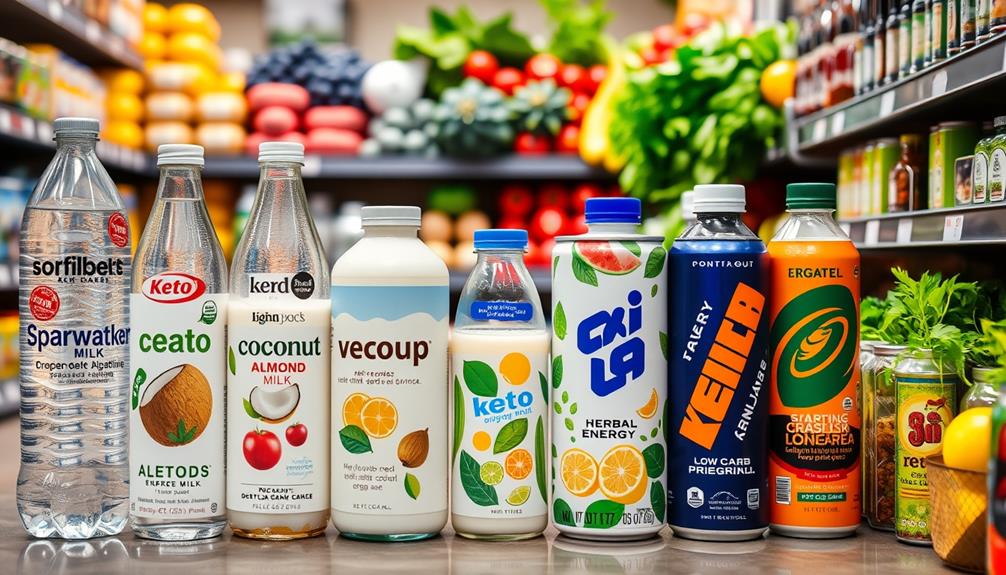
When it comes to staying hydrated on the keto diet, choosing the right beverages is just as essential as selecting your food. You've got several options that are not only keto-friendly but also help keep your hydration levels up.
| Beverage | Benefits |
|---|---|
| Sparkling Water | Flavored but unsweetened, combats dry mouth during keto flu. |
| Coffee | Black or with unsweetened cream, boosts metabolism, low-calorie. |
| Tea | Herbal or green, low-calorie, rich in antioxidants. |
| Bone Broth | Nutrient-dense, rich in electrolytes for hydration support. |
| Keto-Friendly Alcohol | Dry wines or low-carb cocktails with sugar-free mixers. |
Incorporating these beverages into your routine can make a big difference. Sparkling water is invigorating, while coffee and tea can provide a comforting warmth. Bone broth not only aids hydration but also supports your overall health during the shift to ketosis. If you enjoy a drink now and then, opt for keto-friendly alcohol in moderation to maintain your state of ketosis. Staying hydrated has never been easier with these delicious, low-calorie options!
Alcohol on the Keto Diet

Enjoying a drink can still fit into your keto lifestyle, as long as you choose wisely. When it comes to alcohol, focusing on options that align with your keto diet is essential. Here are some great choices:
1. Dry Wines: Opt for dry wines like Pinot Noir and Cabernet Sauvignon, which have lower residual sugar and fit well within your carb limits.
Additionally, it's vital to research companies thoroughly to guarantee you're aware of any potential risks in your financial decisions, just as you'd with your dietary choices.
2. Hard Liquors: Spirits such as vodka, gin, tequila, and rum contain no carbohydrates. Mix them with sugar-free mixers for a rejuvenating drink without the carbs.
3. Brut Champagne: If you enjoy bubbly, stick to brut varieties in moderation, as they're lower in carbohydrates compared to sweeter options.
4. Check Labels: Always check labels for added sugars or carbs in cocktails and mixers. These can greatly impact your daily carbohydrate allowances.
Remember to consume alcohol in moderation—no more than one drink per day for women and two for men, according to CDC guidelines. Making smart choices will help you enjoy your drinks without derailing your keto diet.
Meal Planning Tips
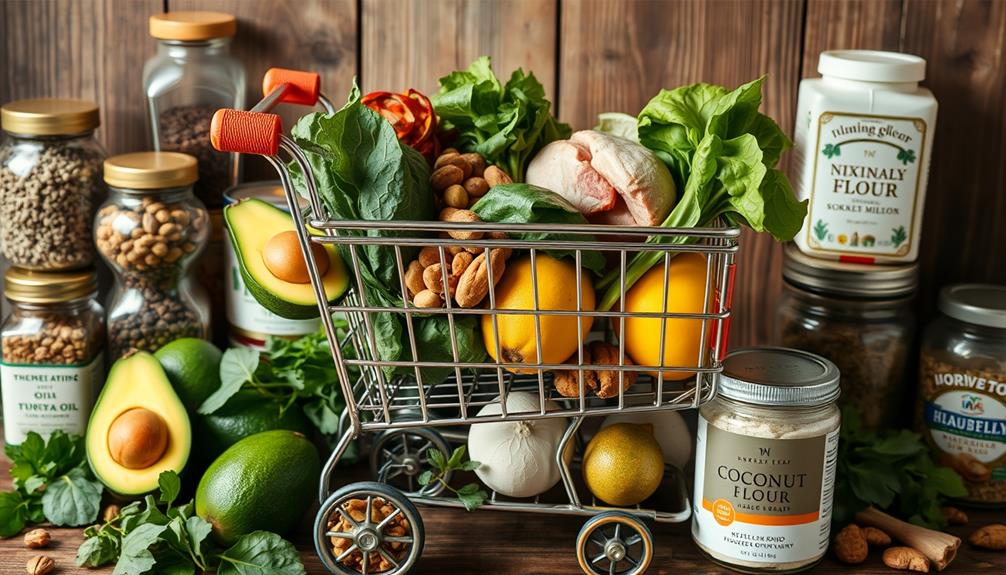
Meal planning is an essential part of successfully sticking to your keto diet. Start by selecting keto recipes for the upcoming 3-7 days, guaranteeing you meet the macronutrient guidelines of 70% fat, 25% protein, and 5% carbohydrates.
Consider looking into financial considerations for elderly care if you're helping an aging family member, as meal planning can help manage their nutritional needs as well. Create a thorough shopping list that includes all the necessary ingredients, focusing on whole foods to maximize your nutrient intake.
Meal prep is key to maintaining your keto lifestyle. Prepare meals in advance, and consider batch cooking proteins and low-carb vegetables to streamline your cooking process. This approach reduces the temptation to stray from your diet when you're busy or tired.
Incorporate flexible meal options like scrambled eggs, vegetable omelets, or salads for those hectic days. These meals are quick to prepare and keep you on track with your keto goals.
Additionally, regularly assess your pantry and refrigerator to identify keto-friendly items you can use in your meal planning. This not only minimizes food waste but guarantees you always have suitable options on hand.
Dietary Considerations
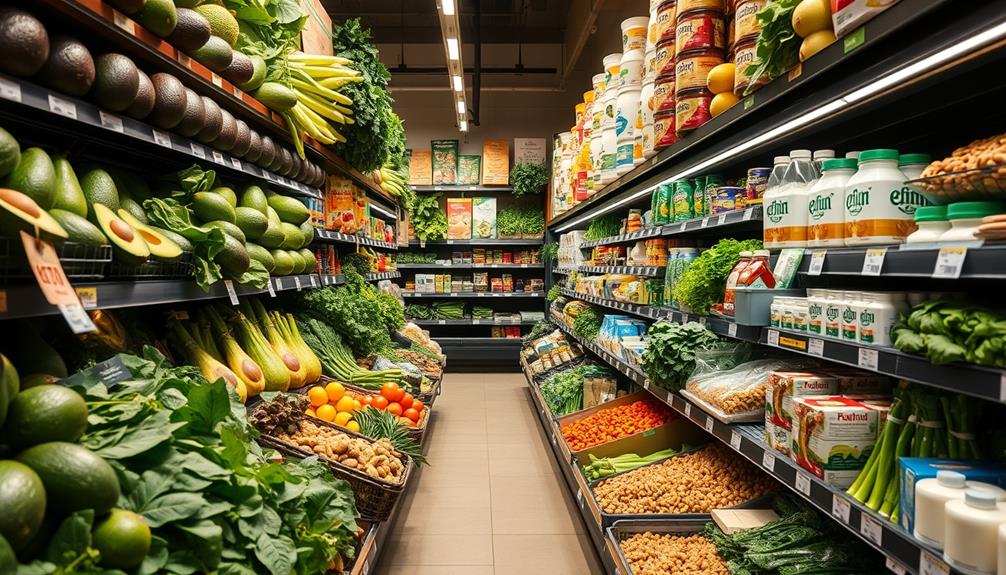
Understanding dietary considerations is fundamental for anyone starting on the keto diet. It's vital to limit your carbohydrate intake to about 30-50 grams of net carbs daily to maintain ketosis, which helps in achieving weight loss and health benefits.
Here are some key points to keep in mind:
- Prioritize Unprocessed Foods: Focus on unprocessed keto foods like fresh vegetables, nuts, and seeds that provide essential nutrients without added sugars. Proper hygiene is equally important in other areas, such as piercing care and hygiene, to guarantee safe practices in personal care.
- Healthy Fats: Incorporate healthy fats such as olive oil, avocado oil, and grass-fed butter, while avoiding unhealthy saturated fats and processed meats.
- Monitor Medications: If you're on hypoglycemic medications, consult with a healthcare professional before starting the keto diet to minimize risks of low blood sugar levels.
- Be Aware of Keto Flu: During the initial phase, you might experience "keto flu," which includes symptoms like fatigue and headaches as your body adapts to burning fat for fuel.
Frequently Asked Questions
What Foods to Stock up on for Keto?
You should stock up on healthy fats like olive oil and avocado oil, low-carb veggies such as leafy greens and zucchini, high-quality proteins like salmon and eggs, plus keto-friendly flours and berries for variety.
What Is the Classic Keto Food List?
The classic keto food list includes high-fat foods like olive oil, cheese, and fatty meats, alongside low-carb veggies such as leafy greens and zucchini. Avoid high-carb grains, sugary snacks, and most fruits for best results.
What Are the Top 10 Keto Foods?
When considering top keto foods, you'll want to focus on eggs, avocados, leafy greens, fatty fish, nuts, seeds, cheese, coconut oil, berries, and low-carb vegetables. They'll help you maintain ketosis effectively.
What Foods Can I Eat Unlimited on Keto?
Did you know non-starchy vegetables can help you feel full with just 5 calories per cup? On keto, you can eat unlimited leafy greens, zucchini, and cauliflower, which keeps your meals satisfying and low in carbs.
Conclusion
Now that you've got your keto grocery list in hand, you're ready to commence this exciting dietary journey. With the right ingredients, you can whip up delicious meals that keep you on track. Isn't it empowering to know you can enjoy flavorful foods while reaching your health goals? Remember to plan your meals and stay mindful of your macronutrient intake. You're set to thrive on the keto diet—happy shopping and cooking!
